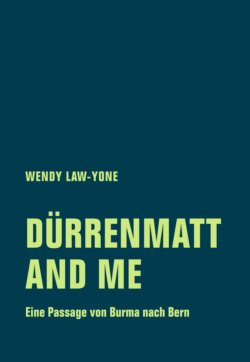Читать книгу Dürrenmatt and me - Wendy Law-Yone - Страница 8
From Berne to Burma and Back Wendy Law-Yone, Friedrich Dürrenmatt, and World Literature
ОглавлениеOliver Lubrich
Wendy Law-Yone’s journey led from Burma to Berne, and Friedrich Dürrenmatt accompanied her on it. This is what the Burmese author tells us in this book.
Born in Mandalay, central Burma, in 1947, Wendy Law-Yone grew up as the daughter of the independent journalist Edward Law-Yone (1911–1980), founder and publisher of the daily newspaper The Nation. Her memoir, Golden Parasol: A Daughter’s Memoir of Burma (2013), is a tribute to her father’s legacy, professional and familial. It was after the military coup in 1962, when her father was imprisoned and she was barred from higher education, that Law-Yone first learned German. ‘All around me was chaos,’ she remembers, ‘but the German language gave me a structure.’ When the library of the Goethe Institute in Rangoon closed and she helped pack the books, she discovered Friedrich Dürrenmatt.
Following her flight from Burma, Law-Yone wrote an essay on Dürrenmatt that helped open the doors to a university in the USA. She graduated with an honours degree, submitting for her thesis an early version of what would become her first novel, The Coffin Tree (1983). Her second novel, Irrawaddy Tango (1993), was a response to Dürrenmatt’s play, The Visit (1956), and centres on the return and revenge of an exiled woman who was once the dictator’s lover. In Wendy Law-Yone’s life and work, the German language and Dürrenmatt’s writing form a political and existential metaphor. They represent her engagement with Burma, its history and its dictatorship.
In the fall term of 2015, Wendy Law-Yone was the Friedrich Dürrenmatt Guest Professor for World Literature at the University of Berne, in the home canton of Switzerland’s celebrated writer. She taught a weekly seminar on contemporary Asian literature, ‘Explosive Transformation: Globalisation and its Discontents in Asian Fiction’. The syllabus featured novels by Aravind Adiga from India (The White Tiger), Mohsin Hamid from Pakistan (How to Get Filthy Rich in Rising Asia), Yu Hua from China (The Seventh Day), and her own work (The Road to Wanting), in addition to short stories by Krys Lee from Korea and Prajwal Parajuly from Nepal, and others. In a workshop entitled ‘The Road to Wanting: a Zomian Journey’, Law-Yone took a group of doctoral students on an imaginary voyage to the border region between Burma and China, using her novel The Road to Wanting (2010) as a guidebook. The writer advocates the rights of ethnic minorities and publicly criticizes the treatment of the Muslim Rohingya. In addition to her seminar and the PhD workshop at the University, Law-Yone gave public lectures and readings and took part in discussions in Berne, Basle, Biel, Zofingen and Zurich.
The Friedrich Dürrenmatt Chair for World Literature was established at the University of Berne in 2013. Its goal is to convey literature ‘firsthand’, with international authors as teachers. The programme is neither ‘Creative Writing’ nor ‘Lectures in Poetics’. Rather, the guest professors teach a topic of their choice in a form of their choice. Their curricula feature new content not ordinarily offered by academic scholars. The introduction of experimental forms of teaching in an open space of creativity are an attempt to counterbalance the ever more bureaucratic course of studies. Joanna Bator from Wałbrzych, for example, held a class on ‘Uncanny Places’, and encouraged her students to explore those in Berne. Juan Gabriel Vásquez from Bogotá discussed his theories about the ‘DNA’ of the novel with his students and with international colleagues—among them Javier Cercas from Madrid, via Skype conference calls. David Wagner from Berlin taught the art of ‘promenadology’ as practiced by Walter Benjamin and Robert Walser, in the old town and the hills of Berne. The aim was ‘to look at the familiar with the gaze of the foreigner’.
Friedrich Dürrenmatt was born in Konolfingen in the canton of Berne in 1921. He studied at the University of Berne. The name Dürrenmatt thus stands for world literature from Berne.
Wendy Law-Yone proves that Dürrenmatt’s literature travelled all the way to Burma and took on new meaning there. The guest professorship named after him acknowledges Dürrenmatt’s reach in reverse, bringing world literature to Berne. The authors have come from Germany, Poland, Haiti, Cuba, Congo, Colombia, Denmark, China, Turkey, Israel, and France as well as from Switzerland. And from Rangoon, Burma.
The Friedrich Dürrenmatt Guest Professorship for World Literature was created with the generous support of the Mercator Foundation Switzerland and with the Burger Community Berne. This book was made possible thanks to the Pro Scientia et Arte Foundation. Thomas Nehrlich, Delia Imboden, Vera Jordi, Elena Bertagna, Livia Notter, Petra Riedweg, Michael Toggweiler, Ariane Lorke, Gabriel Rosenberg, Viviane Blanchard, and Manuela Rossini have contributed to the project since 2013.
